Publications
For submission of articles or Working Papers to CEsA, please send an email to:
comunicacao@cesa.iseg.ulisboa.pt
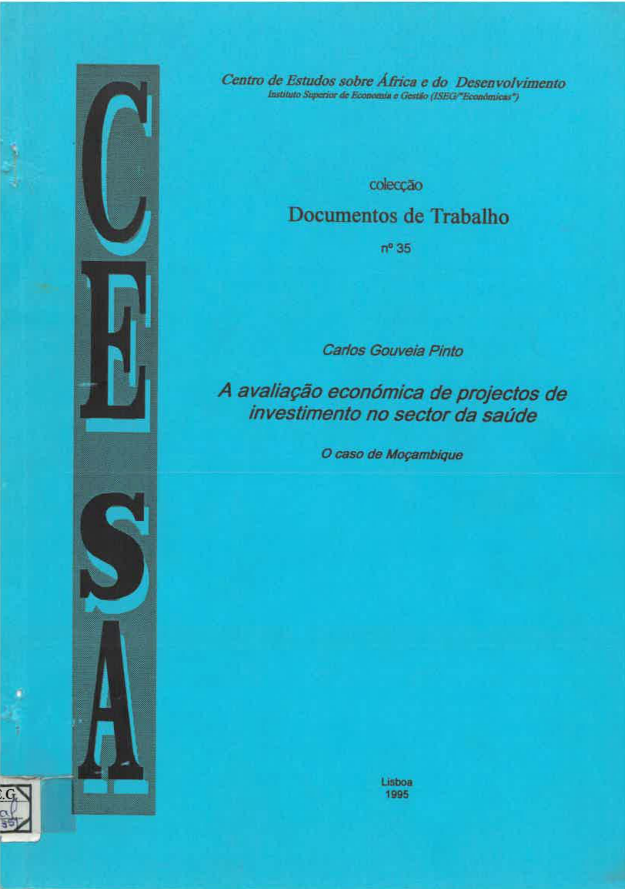
Working Paper 35/1995: A avaliação económica de projectos de investimento no sector da saúde: o caso de Moçambique
Abstract:
In most countries, public investment in the health sector is carried out without the criteria underlying the decisions being made explicit. At most, it is possible to deduce that priorities are established taking into account the degree of coverage of the population, with greater importance (since the Alma Ata conference) being given to primary health care services. This implies considering that, ultimately, the contribution of the health sector to social well-being depends on the density of care (especially first-line care), determined on the basis of demographic criteria. But this approach is manifestly insufficient. In fact, by basing decisions solely on demographic trends, the health conditions of the population are not considered. In particular, no role is given to morbi-mortality indicators. A avaliação económica de projectos de investimento no sector da saúde: o caso de Moçambique defends the position that it is desirable that, in the case of Mozambique, the investment process should be flexible, reflecting local constraints. This is due, in the first place, to the fact that the orientation followed by the Mozambican health policy (since 1975) coincides with the recommendations generally advanced by international experts and, in particular, by the World Bank, so the adoption of the conclusions of the your report would be redundant.
Quotation:
Pinto, Carlos Gouveia. 1995. “A avaliação económica de projectos de investimento no sector da saúde: o caso de Moçambique”. Instituto Superior de Economia e Gestão. CEsA – Documentos de Trabalho nº 35/1994.
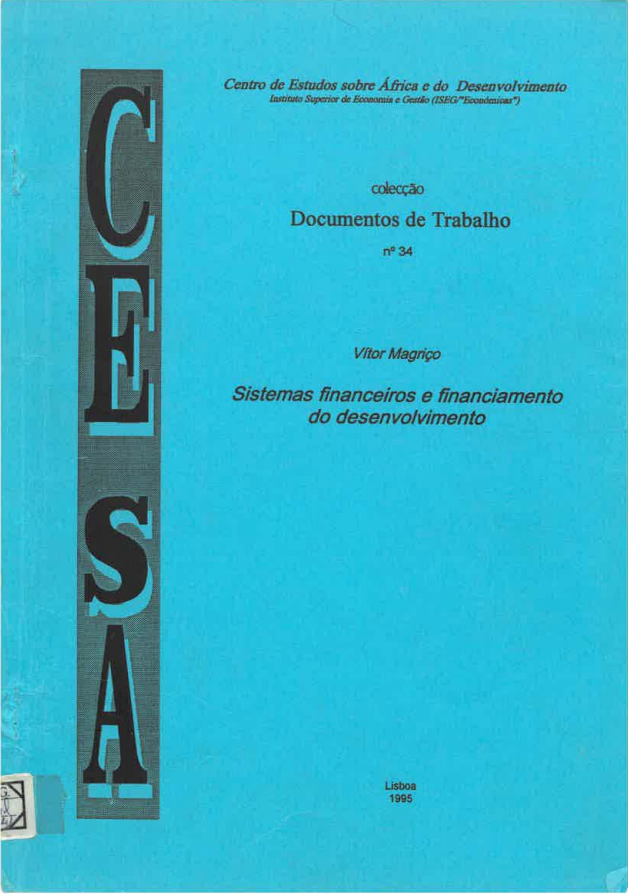
Working Paper 34/1995: Sistemas financeiros e financiamento do desenvolvimento
Abstract:
Sistemas financeiros e financiamento do desenvolvimento has different characteristics from those usually published in collections of this type, including itself. In fact, it is a “class guide” prepared by the author and intended to support the study of the subject Financial Systems and Development Finance of the Master’s in International Development and Cooperation taught at the School of Economics and Management (ISEGIUTL). Hence its characteristic form. Although CEsA is aware of the difference between this and the other titles published in this collection, given the interest of the topic, the quality of the text and the fact that it is one of the few documents on the subject prepared by a Portuguese author, it decided to publish it so that it could be made available to a wider public who might be interested in the topics it covers. We intend to fulfill the objective of our program by successively addressing three major themes: a framework that allows us to discuss the relationship between financing and development on a theoretical basis (point 2); role of financial intermediation and sources of financing in the development process (point 3) and importance of economic policy for strengthening domestic savings in developing economies (point 4). However, we start our program with an introductory point in which we intend to approach the evolution of the financing structure of the economies that are our object of study.
Quotation:
Magriço, Vitor. 1995. “Sistemas financeiros e financiamento do desenvolvimento”. Instituto Superior de Economia e Gestão. CEsA – Documentos de Trabalho nº 34/1995.
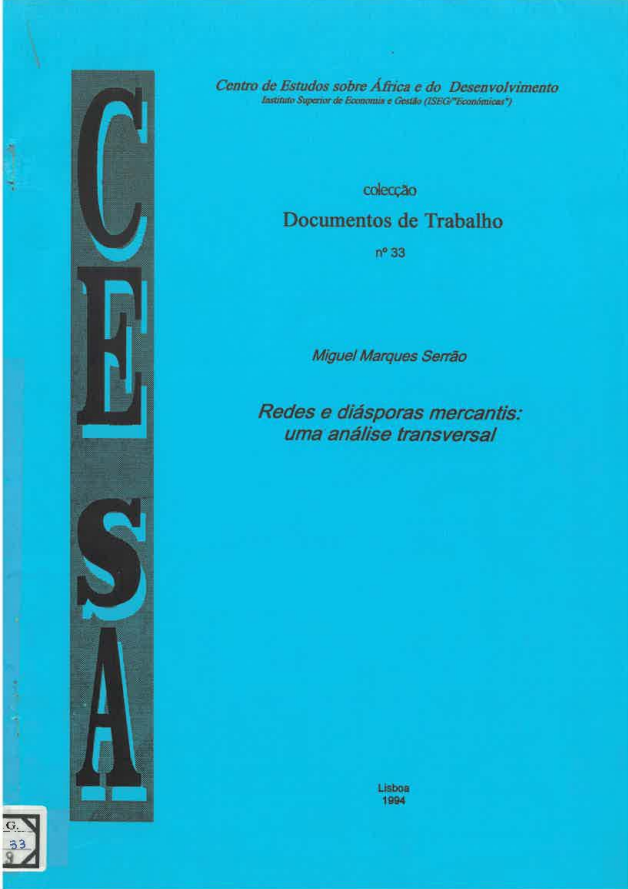
Working Paper 33/1994: Redes e diásporas mercantis: uma análise transversal
Abstract:
In Redes e diásporas mercantis: uma análise transversal, we propose to study the “mercantile means” in three essential and deeply interrelated aspects: – the first concerns its internal organization; its logic of action and accumulation. Particularly important in this regard is the study of the “network system” which, as we shall see, constitutes a complex form of organization, with remote origins but revealing, at the same time, an inexhaustible adaptive and dynamic capacity. We will also attempt a systematic typification of the most common “modalities” of accumulation. – secondly, it is important to clarify which exogenous dynamics influence mercantile action. It is intended, above all, to study the different forms of articulation between the family/lineage, social, political and religious spheres and the mercantile means. Basically, the different “fields” that will shape mercantile action but that, simultaneously, are being reconfigured under its influence. Particular attention should be given to the ideological “conditions” (for example, in the sphere of religion) appropriated by mercantile networks and, sometimes, modified according to their own interests. Finally, we intend to address the issue of the insertion of mercantile networks in space and time. The first dimension is fundamental, either because of its central position in the elaboration of mercantile accumulation strategies, or because the network expansion process is almost always confused with migratory movements that configure authentic “mercantile diasporas” (hence, the choice of title of this work). The second dimension makes it possible to investigate the issue of diachronic continuity of trade networks. A long-term view is useful, namely, because it facilitates the analysis of the elements of “permanence” and “break” that frame our object of study.
Quotation:
Serrão, Miguel Marques. 1994. “Redes e diásporas mercantis: uma análise transversal“. Instituto Superior de Economia e Gestão. CEsA – Documentos de Trabalho nº 33/1994.
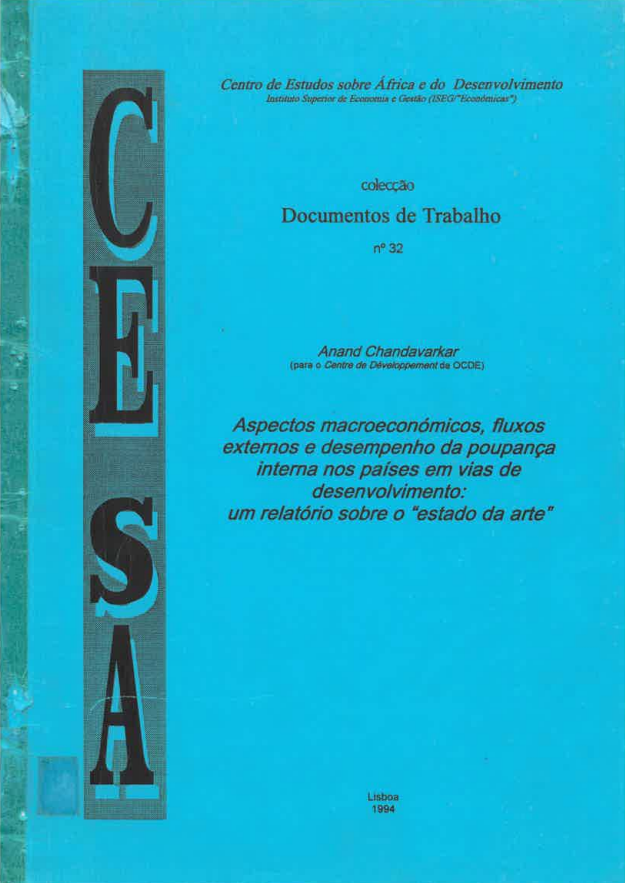
Working Paper 32/1994: Aspectos macroeconómicos, fluxos externos e desempenho da poupança interna nos países em vias de desenvolvimento: um relatório sobre o ‘estado da arte’
Abstract:
Aspectos macroeconómicos, fluxos externos e desempenho da poupança interna nos países em vias de desenvolvimento: um relatório sobre o ‘estado da arte’ is a state-of-the-art report on the scope and efficacy of macroeconomic policies, both demand-management and supply-side, in relation to the level and composition of aggregate domestic savings (household, corporate, and government) performance in developping countries. Its central focus is on the extent to which macroeconomic policies help or hinder the optimal mobilisation and allocation of voluntary and contractual savings. It analyses: the impact of fiscal policies [fiscal balance, taxation, tax Incentives); fiscal reforms and savings; and the Interaction between Government and private savings; the financial repression and inflationary finance as contributory factors to low domestic savings; Implications of financial liberalisation for savings and Investment; the linkages between formal and Informal finance; the regulatory, prudential, and development role of central banks; exchange rate and external finance policies and their bearing on capital flight and inflows of external resources. In the light of the analysis and evidence the paper draws the relevant policy and institutional inferences for the matching of instruments and targets and also presents an agenda for further research on the domestic savings performance of developing countries to extend and improve the data base for domestic savings policies.
Quotation:
Chandavarkar, Anand. 1994. “Aspectos macroeconómicos, fluxos externos e desempenho da poupança interna nos países em vias de desenvolvimento: um relatório sobre o ‘estado da arte’”. Instituto Superior de Economia e Gestão. CEsA – Documentos de Trabalho nº 32/1994.
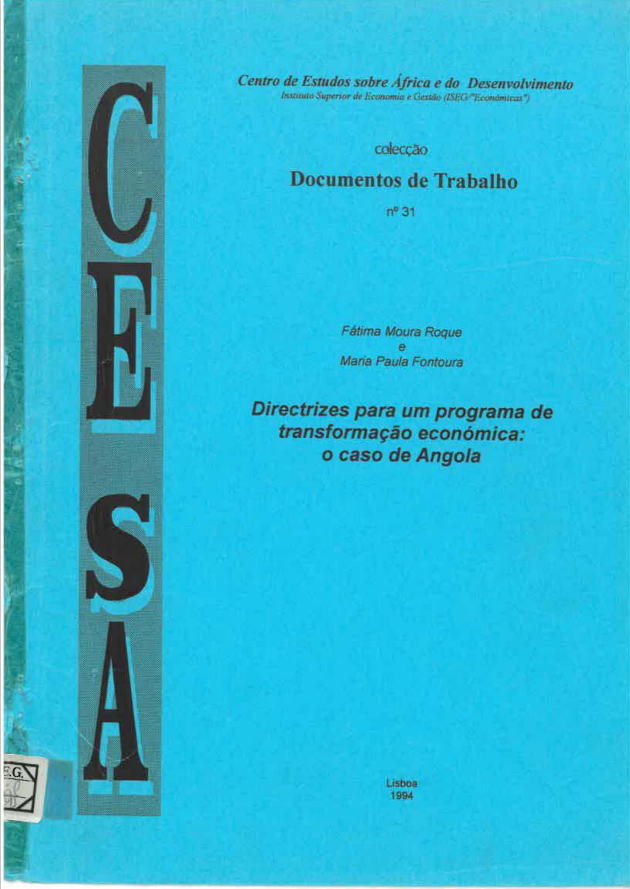
Working Paper 31/1994: Directrizes para um programa de transformação económica: o caso de Angola
Abstract:
The transformation of a centrally managed economy into a market economy (economy in transition) has proved to be a complex task. There is a consensus that the transformation of these economies subject to a prolonged absence of market incentives has to be guided through a program with measures properly articulated and put in perspective over time. But economic theory does not have “ready-made” recipes, and past experience is insufficient for the time being. It is possible to glean some lessons in economies that transitioned from a certain degree of planning to market economies, as was the case in Germany after the war or Spain in the 1970s, and in cases of economic success driven by the State in economies with a productive apparatus weak, found in East Asia. In Latin America there are also important experiences in terms of pro-market reforms in the 1980s. However, what is at stake – and here lies the “novelty” of the matter – is the transformation of economies where antagonism towards to market mechanisms and incentives – the case of most African and Eastern European economies, as well as China and other Asian economies. In Directrizes para um programa de transformação económica: o caso de Angola, in point I, we formulate some guidelines for the formulation of a program of economic transformation of an economy in transition. In point II, we make an application to the Angolan economy.
Quotation:
Roque, Fátima Moura e Maria Paula Fontoura. 1994. “Directrizes para um programa de transformação económica: o caso de Angola”. Instituto Superior de Economia e Gestão. CEsA – Documentos de Trabalho nº 31/1994.
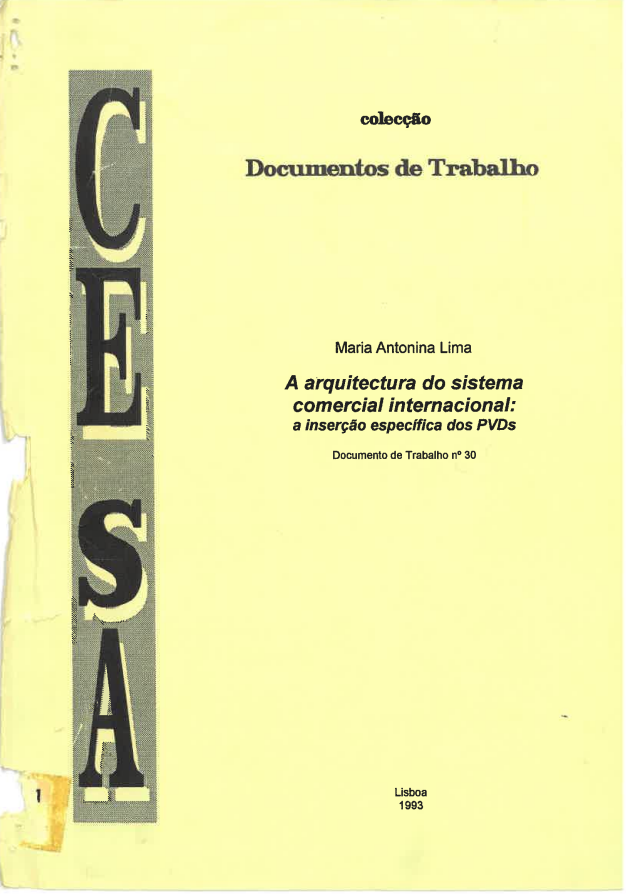
Working Paper 30/1993: A arquitectura do sistema comercial internacional: a inserção específica dos PVDs
Abstract:
We can speak of the constitution, at the level of the world economy, in the post-World War II of an International Commercial System (ICS), the cornerstone of which is GATT – General Agreement on Tariffs and Trade. The principles on which the ICS is based are, through GATT, the benefits that theoretically derive from the practice of free trade in international commercial relations. Over the last decade, however, GATT practice has been moving away from the initial conceptions of free trade. Thus, GATT has progressively appeared as a manager of the new forms of protectionism. In parallel the character the character of GATT has evolved in a radical way: it is not only trying to regulate trade measures at the border, but also trying to “normalise” trade policies that have secondary effects on trade flows (TRIMS and TRIPS). The purpose of A arquitectura do sistema comercial internacional : a inserção específica dos PVDs, is to outline the main trends in the evolution of the ICS: disarmament of tariffs, establishment of GSPs, non-tariff barriers and regional integration.
Quotation:
Lima, Maria Antonina .1993. “A arquitectura do sistema comercial internacional : a inserção específica dos PVDs” . Instituto Superior de Economia e Gestão. CEsA – Documentos de Trabalho nº 30/1993.
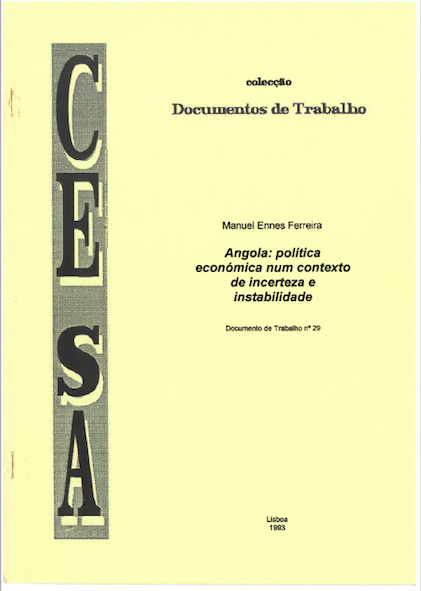
Working Paper 29/1993: Angola: política económica num contexto de incerteza e instabilidade
Abstract:
Angola: política económica num contexto de incerteza e instabilidade covers the period of the First Republic in Angola (1975 to September 1992). Its main objective concerns Angolan economic policy: its context, its implementation and conditioning factors. The presentation will be made in two interconnected phases: the first, descriptive, the second, more analytical. In both situations, the aim is to show the implications and limitations that arise for economic policy from the consideration of factors of uncertainty and instability which, throughout the period under analysis, have increased in intensity. A systemic approach to Angolan economic policy is proposed, in which it can only be understood as a function of the domestic economic, social, political, military and international environment. Within the framework of the Angolan political and economic system that prevailed during the First Republic (November 1975 to September 1992) the one-party system and the state’s tutelary action in the economic domain reigned supreme. The definition of economic and social development objectives and of the economic policy to be applied always took place during the institutional ritual typical of these situations, where Party/Government/State were confused.
Quotation:
Ferreira, Manuel Ennes. 1993. “Angola: política económica num contexto de incerteza e instabilidade”. Instituto Superior de Economia e Gestão. CEsA – Documentos de Trabalho nº 29/1993.
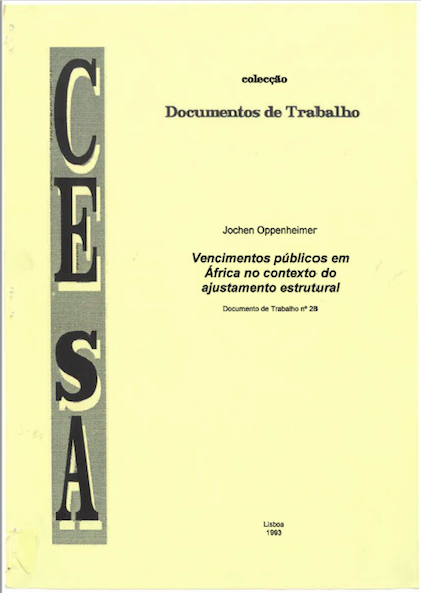
Working Paper 28/1993: Vencimentos públicos em África no contexto do ajustamento estrutural
Abstract:
We analyse, in Vencimentos públicos em África no contexto do ajustamento estrutural, the evolution of civil service wages and staffing in African countries (excluding the productive public sector) in a context of wage restraint and in a comparative perspective. We will try to highlight some of the reasons why “less State” (in budgetary terms) is not necessarily equivalent to “better State” (in terms of efficiency). To this end, in the first part, we will make a comparison between the number of public employees and wages in developing countries and OECD countries. The second part will be an analysis of the African public payroll and salaries, and the following parts will present examples from selected African countries (Mozambique, Tanzania, Uganda), addressing in more depth the tensions and trade-offs between ‘less state’ and ‘better state’ in African socio-economic and cultural contexts. The conclusion will highlight some theoretical implications of the analysis presented. In this text, we will analyse the evolution of civil service personnel and salaries in African countries (excluding the productive public sector) in a context of wage restraint and in a comparative perspective. We will try to highlight some of the reasons why “less State” (in budgetary terms) is not necessarily equivalent to “better State” (in terms of efficiency). For that purpose, we will compare, in a first part, the number of public employees and wages in developing countries with those in OECD countries. The second part will be an analysis of public employees and salaries in Africa, and the following parts will present case studies of selected African countries, focusing on the tensions and trade-offs between ‘less state’ and ‘better state’ in African socio-economic and cultural contexts.
Quotation:
Oppenheimer, Jochen.1993. “Vencimentos públicos em África no contexto do ajustamento estrutural”. Instituto Superior de Economia e Gestão. CEsA – Documentos de Trabalho nº 28/1993.
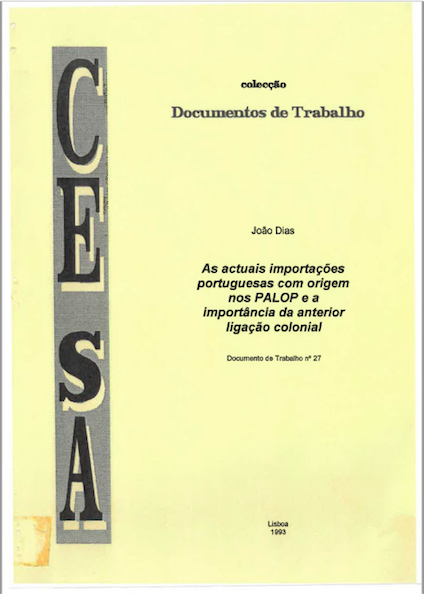
Working Paper 27/1993: As actuais importações portuguesas com origem nos PALOP e a importância da anterior ligação colonial
Abstract:
In As actuais importações portuguesas com origem nos PALOP e a importância da anterior ligação colonial we discuss current Portuguese imports from the PALOP countries are rather small, representing together only about half a percentage point of the total. If we exclude oil imported from Angola, the importance of the PALOP countries falls even further, representing, in 1990, a mere 0.1 per cent of non-fuel Portuguese imports. These figures contrast sharply with those observed for the period prior to decolonization, when the PALOP accounted for percentages in the range of 10 to 15 per cent (appendix 1). Naturally, this drop is understandable in view of the break occurred in 1974-75 and is not, moreover, an exclusive phenomenon of the late Portuguese decolonization. In France, the United Kingdom, the Netherlands and Belgium, too, the former colonies now account for a minimal share of the respective imports. The reduction in the role of the ex-colonies as suppliers to the ex-metropolis also corresponds to a decline in the importance of the Portuguese market as a destination for PALOP exports, although here the contrast between the pre- and post-independence situation of these countries is less marked. In any case, only in the case of Guinea Bissau and Cape Verde does Portugal now absorb more than 10% (in this case, between 20 and 30%) of their total exports. Despite the low levels of PALOP exports to Portugal mentioned at the beginning of the text, the figures involved must, of course, be analysed taking into account the particular relationships involving these countries in the past and the projection of these relationships in the specific ties that still link them in the present. A decade after the independence of the PALOP countries, the influence of these ties translates into a value of their exports to Portugal between thirty and fifty times what would be expected in the absence of such ties. Naturally, the existence of trade presupposes the availability of products to be exchanged, and these exports would have a different expression if the PALOP’s offer were broader, including a wide range of manufactured products. This has to do with economic development (and the absence of internal armed conflicts).
Quotation:
Dias, João .1993. “As actuais importações portuguesas com origem nos PALOP e a importância da anterior ligação colonial”. Instituto Superior de Economia e Gestão. CEsA – Documentos de Trabalho nº 27/1993.
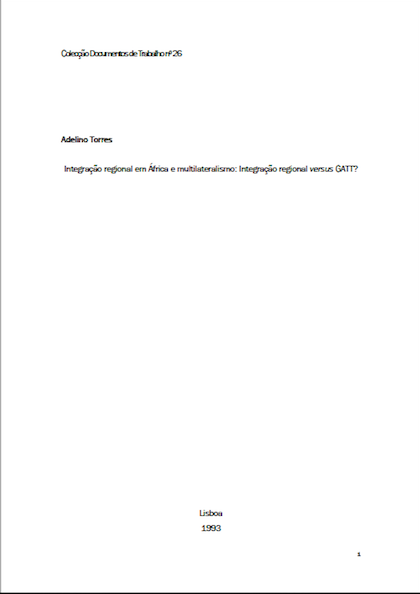
Working Paper 26/1993: Integração regional em África e multilateralismo: Integração regional versus GATT?
Abstract:
In Integração regional em África e multilateralismo: Integração regional versus GATT? we discuss regional integration in Africa and the insertion of African economies in the global space through multilateralism are central issues for the African continent. However, the process of regional integration, which began in Africa about two decades ago, has proved to be disappointing despite some (modest) progress at the CEAO level, at the same time that the share of African exports in world exports has been decrease, with the consequent marginalization of the continent in the international economy. We defend, first of all, in this text that the African continent should reinforce the aspect of regional integration, without ever losing sight of its inclusion in the trade flows of the world economy. Regionalization thus appears as a transitional means, a preparatory phase during which African economies will have to undergo radical transformations, both economically and politically. Regional integration is a sine qua non condition for African development, but everything suggests that it is an insufficient condition in the medium and long term. The text evokes just some of the issues that underlie the debates between multilateralism and regional integration. In addition to the real or apparent dichotomies, the possible theoretical and practical solutions present a degree of complementarity that deserves to be deepened, not only in terms of the indispensable technical measures, but above all in terms of the concepts inscribed in the theory of knowledge that serve as a reference for them.
Quotation:
Torres, Adelino. 1993. “Integração regional em África e multilateralismo: Integração regional versus GATT?”. Instituto Superior de Economia e Gestão. CEsA – Documentos de Trabalho nº 26/1993





